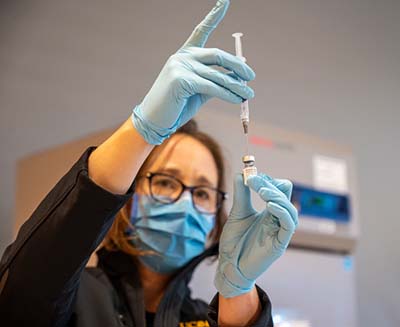UC Davis Health has opened a monkeypox vaccine clinic, with vaccinations available for patients, staff, faculty, and students who are most at risk for infection.

The monkeypox vaccine clinic, located in the Ambulatory Care Center, is open on Tuesdays and Wednesdays. To receive a monkeypox vaccine, UC Davis Health patients, students, faculty or staff should first contact their UC Davis Health primary care physician or schedule an Express Care visit to receive medical approval. With confirmed eligibility of high risk, they can then schedule a monkeypox vaccine appointment in the clinic.
Community members who do not have a UC Davis Health primary care provider should visit a local Sacramento County clinic for vaccination.
What to do if you think you have monkeypox
As cases of monkeypox continue to rise regionally, many people are still unsure what to do if they suspect they have the disease. UC Davis Health is recommending patients who are concerned about a possible monkeypox infection contact their primary care physician's office and ask to speak to an advice nurse. The advice nurse can provide guidance on how to obtain further evaluation and assist with scheduling a test if needed.
Patients who do not have a UC Davis Health primary care provider should visit a local county clinic or a community-based urgent care location.
In most cases, monkeypox is not a medical emergency, so patients do not need to go to the emergency department. Evaluation to determine if monkeypox testing is needed can be scheduled by contacting a primary care physician's office or via urgent care clinics, usually as same day appointments.
Symptoms
Monkeypox might start with symptoms like the flu, with fever, low energy, swollen lymph nodes, and general body aches. Within one to three days (sometimes longer) after the appearance of fever, the person can develop a rash or sores. The sores will go through several stages, including scabs, before healing.
Unusual rashes can be evaluated via video, or by sending a photo. UC Davis Health patients can send a photo of the lesion to their primary care provider through the secure health care mobile app to learn if they should get tested.
Transmission
Monkeypox is transmitted through close person-to-person contact with lesions, body fluids and respiratory droplets, and through contaminated materials such as clothing or bedding.
According to a recent study in The New England Journal of Medicine, patients diagnosed with monkeypox are primarily aged 25–54. The study found 98% are male, and 97% are men having sex with other men. But health experts caution that that anyone can get infected.
Learn More
To learn more about monkeypox read this FAQ featuring Dean Blumberg, chief of pediatric infectious diseases at UC Davis Children's Hospital. He answers frequently asked questions about this disease, what we know so far and how to protect yourself and your family.






